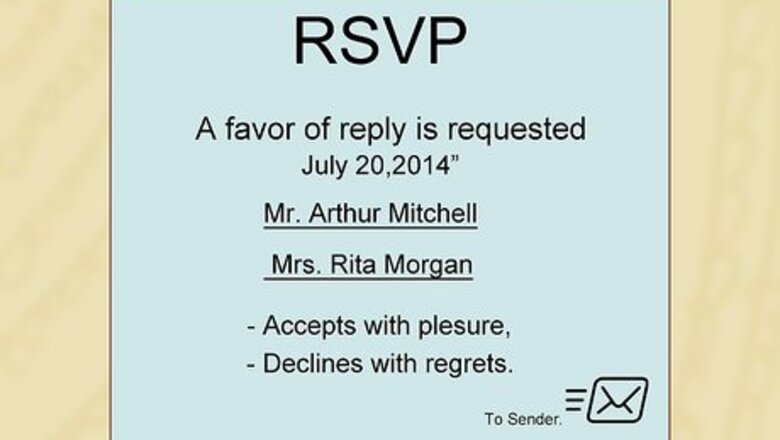
views
Situational RSVPing
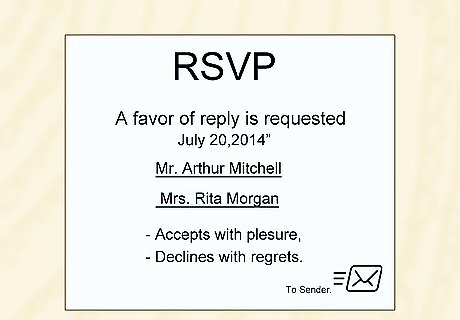
Fill out the RSVP card that was sent with your wedding invitation. Most wedding invitations include an RSVP card with a structured template. For example, an RSVP card might begin with: "A favor of reply is requested by July 20, 2014." This is the cut-off date for responses. Always RSVP by this date, if not sooner. It is considered rude to leave RSVPs to the last minute. Underneath the deadline there will be an item looking like this: "M__________." Here, you will simply need to fill out your title according to your gender. For example: Mr. Arthur Mitchell or Mrs. Rita Morgan. There will be the option of accepting or declining. Sometimes it is simply an empty space next to "Will attend," where you may place a check mark. Other times, it may look like this: "__Accepts with pleasure __Declines with regrets." In this instance, simply check the appropriate box. You may also leave a brief explanation or a note of congratulations. Once the card is properly filled out, mail it back to the sender. A separate envelope is often included with the RSVP card. If you receive a blank RSVP card, simply mimic the template used in standard RSVP cards. State your name in the third person, whether you will attend, and include the date of the wedding. Remember to use formal wording.
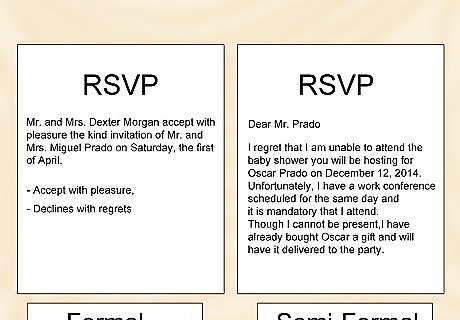
Write an RSVP letter to a formal or semi-formal invitation. Invitations to significant events, such as graduations and baby showers, may not specify how to RSVP. In this situation, writing a letter is the proper etiquette. If you are writing an RSVP letter to a formal invitation, such as a graduation or Bar Mitzvah, keep it simple yet elegant. Write, "Mr. and Mrs. Dexter Morgan accept with pleasure the kind invitation of Mr. and Mrs. Miguel Prado on Saturday, the first of April." If you are declining an invitation, simply substitute "accept with pleasure" with "regret that we are unable to accept." For semi-formal invitations, such as birthdays and baby showers, follow the basic structure of normal letter writing. This letter will be longer than a formal letter but should still be short (only a few sentences). For example: "Dear Mr. Prado, I regret that I am unable to attend the baby shower you will be hosting for Oscar Prado on December 12, 2014. Unfortunately, I have a work conference scheduled for the same day and it is mandatory that I attend. Though I cannot be present, I have already bought Oscar a gift and will have it delivered to the party."
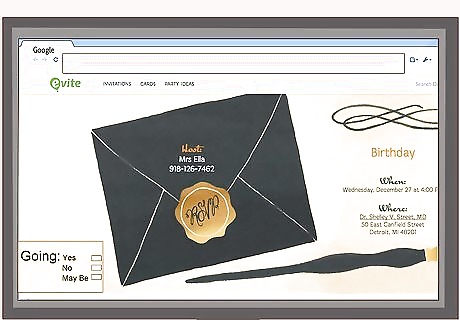
E-mail an RSVP to an Evite. Invitations sent via e-mail are typically reserved for casual events, such as children's birthdays or dinner parties. Sometimes they are used as simpler alternatives to formal paper invitations. Simply open the e-mail containing the electronic invitation. Click "View Invitation." This will direct you to an electronic card where you will be able to RSVP. Select "Yes," "Maybe," or "No." You may also include additional comments. Take the opportunity to ask valid questions such as, "Who's coming?" or "What should I wear?" to help better inform your decision. Sometimes formal events, such as weddings, will opt for electronic invitations. This is typically done to avoid large costs, lessen the stress, or limit paper usage. In any case, you should respond in a formal manner if including additional comments. If you have trouble RSVPing online for an e-vite, you can also call the person to let them know if you're going or not.
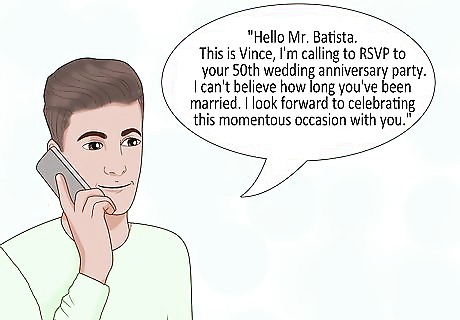
Call to RSVP by telephone. Responding by telephone usually involves very casual and small celebrations. However, sometimes formal and semi-formal invitations will request that you RSVP by phone. If you are responding to a formal invitation, remember to maintain respectful etiquette. Though the RSVP may carry over into conversational territory, always use proper English. Do not use slang or foul language. For example, begin by saying "Hello, is this Mr. Batista?" Once he responds, you can reply with, "Hello Mr. Batista. This is Vince, I'm calling to RSVP to your 50th wedding anniversary party. I can't believe how long you've been married. I look forward to celebrating this momentous occasion with you." Be concise. Although the RSVP may include small talk and pleasantries, try not to carry on the conversation longer than it needs to be. Your host has other potential guests to hear from! For casual invitations, especially from friends, using relaxed language will most likely be acceptable. Conversation length will also vary depending on your relationship with that particular person.
RSVPing Etiquette

Regardless of how you respond, always thank the host for the invitation. Remember that you are being given the privilege of celebrating key events with people who are fond of you. Though it is not mandatory, try to provide a reasonable explanation for declining an invitation. This an empathetic way of informing your host that you, too, have significant matters to attend to. Make an effort to supply a gift for your host. Not only is this customary for big occasions, it is the ultimate sign of thankfulness. You do not have to splurge on an expensive item; as long as the sentiment is there, your host will appreciate your gift.

Reply sooner rather than later. Be sensitive to the time constraints your host faces. Late RSVPs will require time and effort that could be focused on other planning aspects. Knowing the amount of guests ahead of time, especially for highly organized events like weddings, will ease much of the pressure and work to be done by your host. Punctuality not only saves your host trouble, it reflects your level of respect and thoughtfulness as a person.
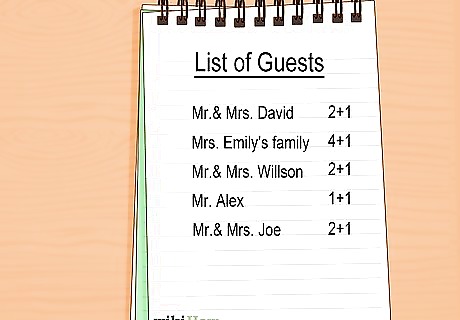
Specify how many guests you will bring. If your host offers you the option of bringing guests, be clear and precise about the number. Formal invitations sometimes offer the option of bringing a "plus-1." Only bring a date or companion if you have already confirmed that you will do so in the RSVP. Informal invitations may allow some room for multiple guests. Regardless, you should always respond in a timely manner. Avoid bringing unexpected guests or too many guests. Avoid ambiguous estimations, such as "a few" or "a couple."
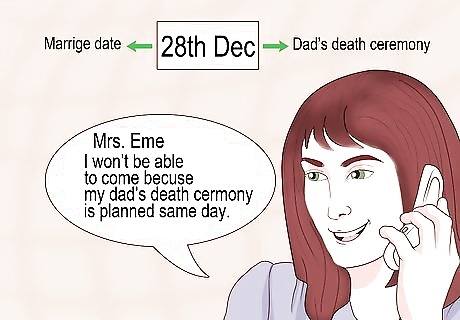
Know how to change or cancel an RSVP. Foregoing a commitment to appear is unfortunate, but sometimes there are extenuating circumstances for canceling an RSVP. If you have recently suffered an injury or illness, have had a death in the family, or have an unavoidable business conflict, canceling an RSVP is acceptable. Call your host immediately if there are last minute complications. The telephone is the quickest way to reach someone and will save your host unwanted surprises. Never miss an event to which you have already made a commitment without first notifying your host. This conveys both disrespect and indifference towards your host's efforts. Do not cancel because you have something better to do. This is extremely rude and inconsiderate.


















Comments
0 comment